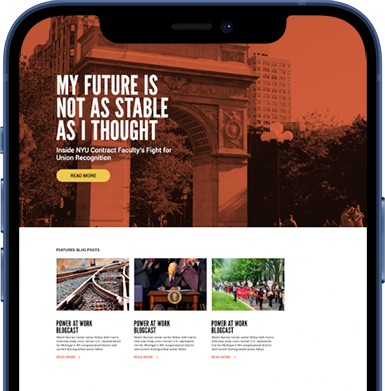I started driving for Uber and Lyft as a way to be a mom to my three teenage sons, not just their provider. At the time, I was raising my boys on my own in Lynn, Massachusetts, far from the rest of my family in the Dominican Republic. Though I had earned a good degree back home, my language abilities limited the kinds of jobs I could get here, and long hours working in restaurants and factories left me no time for my kids. In Massachusetts and across the country, the app-based companies promised a way out of this impossible situation by promoting their drivers’ “independence.”
After five and a half years of driving, I know their promotion is a trap. I still love making my own hours, and in the beginning, I juggled the two apps and the various bonuses they offered, allowing me to build a schedule around my boys’ needs. But it didn’t last. A couple years ago, I declined an Uber customer’s demand to get him to his job on time by driving faster than the speed limit during a snowstorm, and I believe his complaint cost me my job. Later that day, Uber shut off my application, and though I called the company many times, I never received a satisfactory explanation for their “deactivation,” as they call it. I continue to drive with Lyft, but like many drivers for both apps, I’ve found that the amount I make from each ride has steadily shrunk, so I end up working 12 hours a day, six days a week, just to cover my bills.
Luckily, my two eldest sons are now out on their own, and the youngest has graduated high school and begun studying criminology. But lately, the eldest has begun to talk about driving Uber himself, so he can also claim his “independence.”
In the end, too many drivers pay for this independence with their time, sleep, and peace of mind. Every driver I know who depends on this work fears deactivation. The companies add to that anxiety by changing the rules from one day to the next, sending us lengthy legal notices that we have to accept before we can continue driving. As time has gone on, the companies have also made us pay for every expense we incur, from tolls to gas. Imagine a factory where the workers bought the machines, paid for their repair, and were charged for the electricity to run them! Of course, the cars are ours to keep, but we often buy them for the job. The lure of making more with a fancier ride has also led many drivers I know to take out loans for luxury SUVs. Before we know it, we find ourselves constantly driving just to cover our debts.
(Photo from 32BJ SEIU)
Here in the United States, I think it’s somehow easy to confuse isolation for independence. We feel free driving our own cars, and many of us dream of being our own boss. But these faceless apps are a new kind of boss, one that is always watching each one of us while we work alone in our cars. Alone, we are powerless to change anything, which is why unions were created. The problem is that drivers for Uber and Lyft have no way to form one.
I learned that after I joined a WhatsApp drivers’ group and followed it to the Drivers Demand Justice coalition. Led by The Machinists Union, 32BJ SEIU, and the Chinese Progressive Association, the coalition has worked for over a year to pass the Rideshare Drivers Justice Bill. This state law would give us some basic workplace protections, but the most important part of the bill is the creation of a state-monitored mechanism that would allow Massachusetts Uber and Lyft drivers to form a union. In a union, our isolation would end. The tech companies would have to negotiate with us collectively to set our pay and working conditions, including a sensible process to settle disputes. The Massachusetts State House created something similar over ten years ago when it passed unionization laws for workers in childcare and home healthcare, which can also be isolated jobs with variable hours for multiple bosses.
(Photo from 32BJ SEIU)
Often, those jobs are also performed by immigrants just like me and so many people I have met who drive full time for Uber and Lyft. We may not be the majority of drivers, but we do the majority of the work. A recent study found that only one of five rides is made by drivers who work less than 10 hours a week. It also found that, on average, Massachusetts drivers make less than the minimum wage, and our expenses cancel 49 cents of every dollar we earn. The problem is so big, it feels like a public emergency.
Recently, this urgency moved 32BJ and others to gather enough signatures to pass a major hurdle required to put the unionization question on the November ballot if necessary. Polling numbers show that two-thirds of Massachusetts voters support it, too. There is no reason for state legislators to not act sooner and pass the Rideshare Drivers Justice Bill now. You can help by visiting the coalition website and speaking to your legislator, so we can end our isolation, form a union, and achieve our real independence, together.
Victoria Acosta is a mother of three and ride-hailing app driver living in Lynn, Massachusetts.

